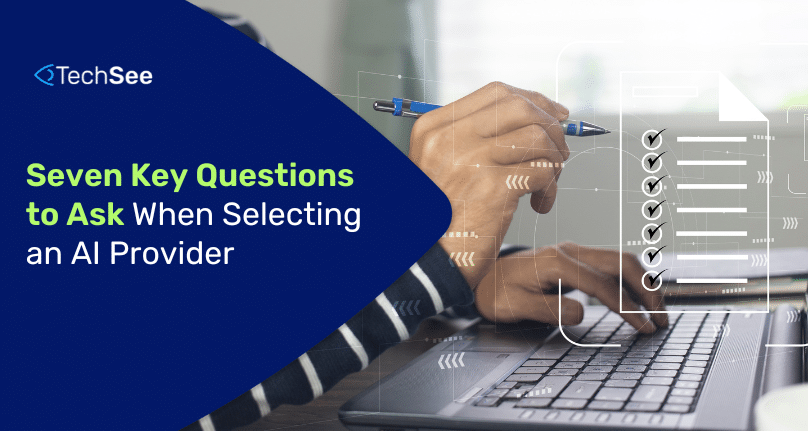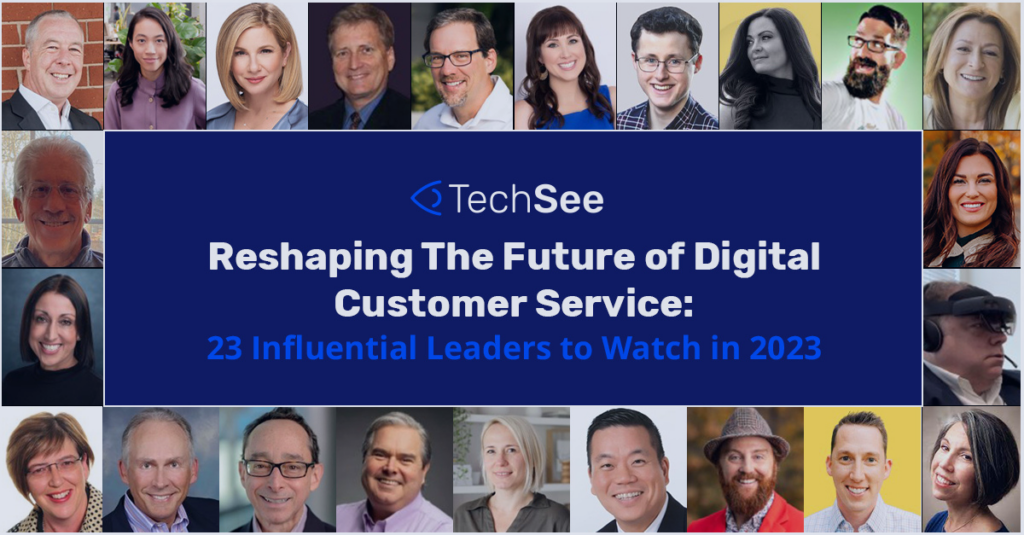With new AI capabilities and compelling use cases being demonstrated daily, the service industry looks forward to a new generation of AI providers that answer their needs for high-quality service automation. Better chatbots, self-service flows, virtual assistants, and AI avatars are being developed worldwide, so how can you find the right AI solution for your organization? Sorting through the many questions asked of our AI team, here are seven of what we feel are the best questions to ask in order to understand if an AI provider is the right partner for you.
1. What practical impact can I expect based on your track record at scale? What enterprise experience does your team have in my industry?
As a potential customer, you want to set expectations upfront and understand how other companies have practically benefitted from an AI solution. It isn’t enough to assess the effectiveness and reliability of the system in a controlled environment. As a potential customer, you want to know if competitors have proven results in the real world, especially in similar use cases or with similar objectives. Prior success stories help to identify the provider’s capacity for a beneficial outcome and make an informed decision.
2. Can you customize the AI technology to meet the specific needs of our business and industry? If so, how?
Every business is different. AI solutions must fit your particular needs. An AI provider may be required to tailor their solution to your industry, use case, customer base, and internal processes. Remember, too, that one size does not fit all. An AI provider with experience in a different industry may not meet your team’s automation needs. Flexibility and familiarity with additional service organizational models are essential when considering a provider or platform for an AI or automation initiative. At the same time, remember that you don’t need to start by automating an entire flow. Many organizations start by automating a part of a flow, learning, and adapting from there.
3. How long can we expect it to take before we see positive results? Is there a training period?
Don’t expect immediate or instant transformation, especially when taking on a task like practical AI automation. For customized AI automation, training and customizing the system takes time and is a critical part of the process. For some projects and providers, this may take days or weeks; for others, you may be looking at a multi-year deployment timeline. An experienced AI partner can provide a structured, well-thought-out onboarding, customization, and staffing strategy and help you develop your KPI objectives and ROI timelines. Be wary of magic beans – if it sounds too good to be true, it likely is. The degree of variance between the timelines impacts business performance, so be sure you understand what you can expect before starting a voyage into the unknown.
4. What resources should I allocate to bring your AI solution into my service organization?
Any transformational initiative will require resources like staffing, planning, operations, and technical implementations and integrations. Experienced providers will provide a blueprint and resources plan based on your objectives and requirements. In addition to the specific operational needs, one of the most complex resources to secure access to is clean, properly labeled data. Some providers can start with data you have already generated or will generate as part of your everyday operations. Others require customized data gathering and labeling. Data gathering may involve employee time and possible investment in additional software and hardware infrastructure. Carefully evaluate your organization’s needs, resources, and potential upside with AI automation to determine the appropriate level of investment warranted and evaluate if this is the right partner for you.
5. What are the typical barriers to adopting or deploying your AI, and how can I best prepare my team for this partnership?
As a pillar of digital transformation, accepting AI automation requires cooperation from across the organization. Similarly, customer-facing applications will require customer adoption. The AI provider must be able to support integrations into your operational and technical flows. These are just a few typical examples. Every provider with enterprise experience should be able to help you identify the challenges you will face and coach you on how to avoid them to succeed.
6. How easily can AI technology be integrated with our existing customer service infrastructure, such as CRM and ticketing systems?
Few enterprises are ready to rebuild their corporate tech stack around a particular AI initiative. Your strategic advisors or the AI provider should work with you to map your existing infrastructure and determine where and how AI automation can streamline workflows and improve customer experience. It helps if the partner or AI provider has worked with clients with similar infrastructure and business objectives, as this should deliver a more manageable transition period.
7. How can your organization help me to refine and meet my service automation objectives today and further down the road? How will your solutions’ roadmap help me deliver continued innovation and impact?
It can be argued that the AI provider’s experience can be the most critical component for success. Speak to the Customer Success team and gauge their understanding of your operations, business objectives, and technical infrastructure. If selected, this group will be your partner from the beginning of your exploration into AI automation through to quarterly reviews and continued growth and impact years into the future.
A good customer success team needs to be able to adjust to technological advances and personnel changes, provide the proper training when necessary, and monitor the AI automation performance and impact to ensure it meets your service needs. Similarly, look for potential alignment between their product roadmap and your long-term vision. You may not need all these features today, but ideally, you want a partner who will continue growing, scaling, and optimizing with you long into the future.
These questions will help you identify the optimal AI automation use case for your team and the right provider to implement the solution. Organized due diligence helps ensure that you are focusing on a use case that aligns with your business objectives, has the potential to deliver significant impact, and is feasible to implement.
If you have questions about how AI service automation can help your organization, please contact us today.






